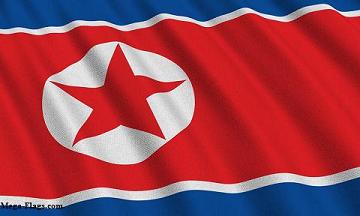Flood Damage in North Korea Prompts International Calls for Assistance

The new United Nations Special Rapporteur on the situation of human rights in the Democratic People’s Republic of Korea (DPRK), Tomás Ojea Quintana, called this week for increased support for the victims of Typhoon Lionrock, which devastated the northeastern part of North Korea earlier this month, according to Relief Web, a website run by the UN Office for the Coordination of Humanitarian Affairs (OCHA).
“According to official figures, 138 people were killed and 400 people remain missing,” Relief Web reports, “The UN estimates that 140,000, including pregnant women, persons with disabilities, older persons and children, require assistance.”
Ojea Quintana urged the international community to increase the support for on-going humanitarian efforts on the ground and stressed, “Given the scale of destruction, the number of individuals affected, and the fact that winter is rapidly approaching, time is of the essence.”

Ojea Quintana noted the sanctions imposed by the United Nations Security Council on North Korea exclude humanitarian assistance and added, “Such aids are now critical to protect the rights to food, health and adequate housing of those affected by Typhoon Lionrock.”
Worst Disaster in Seventy Years
Typhoon Lionrock, which swept through North Hamgyeong and Yanggang Provinces in North Korea from August 29 through September 1, raised the water level of the Tumen River by six to twelve meters and flooded populated areas. The town of Gangan in Hoeryeong City, North Hamgyeong Province reports twenty percent of its population as either dead or missing. An international team of 22 people who surveyed the affected areas from September 6 to September 9 reportedly said, “There is not a single building left standing in the town of Gangan, and it appears as if the entire town has fallen through the earth.”
A UN report released by the Office for the Coordination of Humanitarian Affairs says the scale and scope of the flood damage exceeds preliminary predictions. The typhoon, it says, has destroyed roads leading to Musan and Yeonsa Counties in North Hamgyong Province – making it difficult for relief workers to reach the hardest-hit areas.
It warns the flooding and landslides, which took place just before the fall harvest, have likely knocked out essential crops. Secondary damage from lack of drinking water due to the destruction of water supply plants and transmittable diseases, such as dysentery and respiratory infections could intensify the crisis. The World Food Program warns temperatures will start to drop to below freezing levels in the northern regions of North Korea in late October and fall to negative thirty degrees celsius in the dead of winter. In order to survive through the winter, it said, the flood victims will need continuous assistance.
North Korea also called the latest flood “the worst natural disaster in seventy years” and has appealed for international assistance. Banks, however, are hesitant to transfer money to North Korea due to the UN-imposed sanctions against the country, and this hinders humanitarian assistance, says the World Food Program.
Park Administration Rejects Calls for Humanitarian Aid
The Park Geun-hye administration announced this week that even if North Korea were to make a direct appeal to the South for humanitarian assistance, it would not oblige. At a briefing on September 19, South Korea’s Unification Minister Jeong Jun-hee linked North Korea’s fifth nuclear test to the question of humanitarian assistance and accused North Korea of prioritizing nuclear weapons development over civilian needs. Ministry of Foreign Affairs Spokesperson Seon Nam-guk echoed this view at a briefing the following day.
When asked if the government’s position contradicts the humanitarian assistance clause in South Korea’s ‘North Korea Human Rights Act,’ which went into effect in earlier this month, Jeong replied, “Considering all aspects of the current situation, it is not appropriate to say we must provide humanitarian assistance according to the North Korea Human Rights Act.”
Article 7 of the enforcement ordinance of the North Korea Human Right Act says South Korea shall provide humanitarian assistance for the people of North Korea in moments of urgent crisis, including natural disasters.
South Korean Civil Society Demands Assistance for Flood Victims
Civil society organizations in South Korea, on the other hand, are demanding the government open a channel for them to send humanitarian assistance to their counterparts in the north.
The National Council of Civic Groups for Cooperation with the North, composed of fifty-four organizations, has applied for official permission from the Ministry of Unification to have contact with North Korean citizens for the purpose of providing humanitarian assistance to flood victims and is awaiting a response from the ministry.
In a statement released on September 22, the Labor Division of the June 15 South Korean Committee for Reunification of Korea, composed of the two major South Korean labor union federations – Korean Confederation of Trade Unions and the Federation of Korean Trade Unions – demanded the Park Geun-hye administration immediately allow humanitarian assistance for the North Korean flood victims. “Even if the Park government tries to stop us, the workers in the south will actively participate in providing assistance for flood victims in the north,” it declared.
Opposition parties are also joining the chorus of voices for humanitarian assistance. “From a humanitarian perspective, we cannot delay government and civil society assistance for the flood victims in North Korea,” said Minjoo Party Floor Leader Woo Sang-ho at a meeting of the party’s supreme council at the National Assembly on September 19.
Representative Jo Bae-sook of the People’s Party echoed this view – “Through humanitarian assistance, we need to create an opportunity to open the door for dialogue. The Ministry of Unification should allow contact with the North as soon as possible to facilitate humanitarian assistance by civil society groups.”

